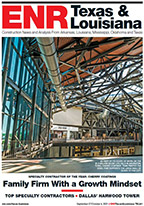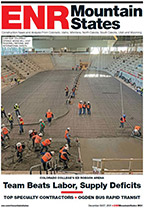An increase in subcontractor failures, more reliance on contractor-obtained financing and the nation's continuing economic sluggishness highlighted concerns facing members of the Construction Financial Management Association as they met at their annual convention on June 23-27 in Orlando, Fla.
Contractors around the nation are increasingly finding that some specialty firms hired for their projects are unable to finish the job due to financial distress. The topic was especially relevant at CFMA's first "Large Firm CFO Roundtable," says Erika Urbani, CFMA chairwoman and chief financial officer with R.D. Olson Construction, Irvine, Calif.
"We are witnessing the financial weakening of a substantial portion of our [company's] subcontractor base," Urbani said. Contractors are more frequently finding themselves forced to issue joint checks or pay subcontractors in advance to keep them working, she added.
Steven Davis, director of construction risk services with Birmingham, Ala.-based McGriff, Seibels & Williams, a CFMA exhibitor, told ENR that, so far, the impact from the specialty failures has been borne mostly by subcontractor default insurance and that bonding companies have largely managed to avoid a major hit.
Heavy-highway firms should also prepare to deal with specialty contractor failures in the coming year, added Robert A. Davidson, a certified public accountant with DGLF, Nashville, Tenn., who led a forum on emerging trends.
Another topic of particular interest to attendees was the growing use of contractor-obtained financing—or "gap" financing—by state transportation agencies.
Here, Florida is leading the way, Davidson said, with more than a dozen contracts using some form of gap financing. But other states are also beginning to employ this tool.
The trend toward contractor financing is a result of state transportation-department budget constraints. With a major boost in federal transportation spending unlikely and 25 state DOT budgets allocating more than 40% of funds to debt bond service, Davidson told contractors, "I think you're in for a rough ride."
Those issues also are driving industry consolidation, which Davidson said could hit 30% by 2015. Additionally, he cited surveys of heavy-highway firms that indicated 70% are considering some form of acquisition or merger.
"There ought to be some consolidation," Davidson commented. "There are too many contractors."






Post a comment to this article
Report Abusive Comment